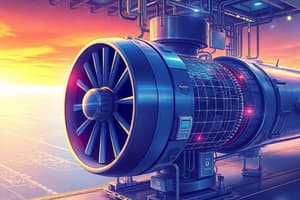Podcast
Questions and Answers
विद्युत शक्ति प्रणाली के ऑपरेशन को किस प्रकार से नियंत्रित किया जाता है?
विद्युत शक्ति प्रणाली के ऑपरेशन को किस प्रकार से नियंत्रित किया जाता है?
- सुपरकंडक्टिंग फॉल्ट करंट लिमिटर्स द्वारा
- स्मार्ट ग्रिड प्रौद्योगिकियों द्वारा (correct)
- पावर इलेक्ट्रॉनिक्स द्वारा
- न्यूक्लियर ऊर्जा से
किस चुनौती का सामना विद्युत शक्ति प्रणाली से किया जाता है, जो साइबर आक्रमण, भौतिक क्षति, या अन्य खतरों से सुरक्षित रखने का होता है?
किस चुनौती का सामना विद्युत शक्ति प्रणाली से किया जाता है, जो साइबर आक्रमण, भौतिक क्षति, या अन्य खतरों से सुरक्षित रखने का होता है?
- सुरक्षा (correct)
- पर्यावरणीय प्रभाव
- संवहनीयता
- पारदर्शिता
कौन-सा प्रमुख संसाधन से विद्युत उत्पादन किया जाता है?
कौन-सा प्रमुख संसाधन से विद्युत उत्पादन किया जाता है?
- हवा से
- परमाणु ऊर्जा से
- लोहा, पेट्रोल, और गैस से
- प्राकृतिक उर्जा स्रोतों से (correct)
क्या हैं 'जेनरेटर' का कार्य?
क्या हैं 'जेनरेटर' का कार्य?
इलेक्ट्रिकल पावर सिस्टम के कितने प्रमुख घटक होते हैं?
इलेक्ट्रिकल पावर सिस्टम के कितने प्रमुख घटक होते हैं?
इलेक्ट्रिकल पावर सिस्टम का मुख्य कारण क्या है?
इलेक्ट्रिकल पावर सिस्टम का मुख्य कारण क्या है?
तारतम्य (Transmission Lines) क्या होते हैं?
तारतम्य (Transmission Lines) क्या होते हैं?
इलेक्ट्रिकल पावर सिस्टम के सामने कौन-कौन सी मुश्किलें होती है?
इलेक्ट्रिकल पावर सिस्टम के सामने कौन-कौन सी मुश्किलें होती है?
इलेक्ट्रिकल पावर सिस्टम के सही और निर्भर संचालन किसके लिए महत्वपूर्ण है?
इलेक्ट्रिकल पावर सिस्टम के सही और निर्भर संचालन किसके लिए महत्वपूर्ण है?
इलेक्ट्रिकल पावर सिस्टम में कौन-कौन से हिस्से मुख््य होते हैं?
इलेक्ट्रिकल पावर सिस्टम में कौन-कौन से हिस्से मुख््य होते हैं?
Flashcards are hidden until you start studying
Study Notes
Electrical Power Systems
Electrical power systems, also known as electrical networks or power grids, are a complex and crucial part of modern life. They provide energy to homes, businesses, and industries, and their efficiency and reliability are essential for maintaining a stable and prosperous society. In this article, we will explore the basics of electrical power systems, including their components, operations, and challenges.
Components of Electrical Power Systems
Electrical power systems consist of three main components: generators, transmission lines, and loads.
-
Generators: These are devices that convert mechanical energy into electrical energy, such as steam turbines, hydroelectric turbines, or internal combustion engines.
-
Transmission Lines: These are the high-voltage power lines that carry electricity from power plants to substations, where it is transformed into lower voltages for distribution to homes and businesses.
-
Loads: These are the devices or appliances that consume the electricity, such as lights, appliances, or industrial equipment.
Operations of Electrical Power Systems
Electrical power systems operate by generating electricity from various sources, such as fossil fuels, nuclear energy, or renewable sources like wind or solar. The electricity is then transmitted through the power grid, which consists of the transmission and distribution systems. The transmission system includes high-voltage power lines, substations, and transformers, while the distribution system includes lower-voltage power lines and transformers that deliver electricity to homes and businesses.
The operation of electrical power systems is controlled by a complex system of monitoring and control, which ensures that electricity is generated, transmitted, and distributed efficiently and reliably. This system includes various devices and technologies, such as power electronics, superconducting fault current limiters, and smart grid technologies.
Challenges in Electrical Power Systems
Despite their importance and complexity, electrical power systems face several challenges, including:
-
Reliability: Ensuring that electricity is available and consistent, even during extreme weather events or unexpected system failures.
-
Efficiency: Maximizing the utilization of resources and minimizing energy loss throughout the system.
-
Sustainability: Reducing the environmental impact of electricity generation and promoting the use of renewable energy sources.
-
Security: Protecting the system from cyberattacks, physical damage, or other threats.
Conclusion
Electrical power systems are a vital aspect of modern life, providing energy for homes, businesses, and industries. They consist of generators, transmission lines, and loads, and their efficient and reliable operation is crucial for maintaining a stable and prosperous society. Despite the challenges they face, electrical power systems continue to evolve and adapt to meet the changing needs of society.
Studying That Suits You
Use AI to generate personalized quizzes and flashcards to suit your learning preferences.




